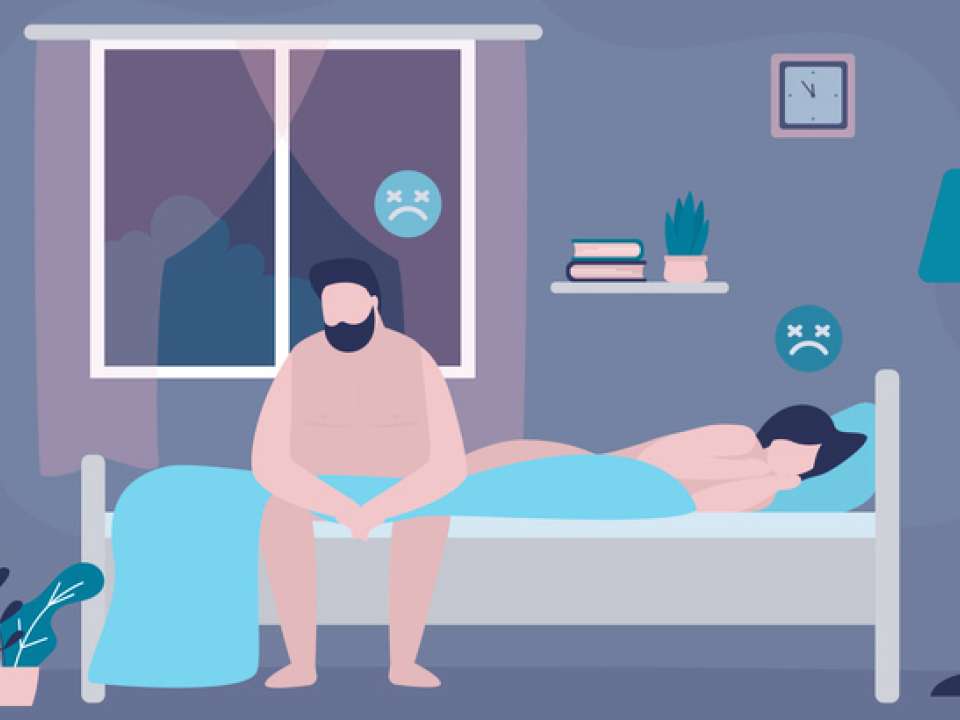
You’ve probably heard that your sex drive will plummet or vanish as you get older. (Or, if you’re a woman of a certain age, now you’re suddenly a sex-hungry cougar — sexist much?!) Neither of these stereotypes accurately represents the many ways your libido can change with age — for better, for worse, or for somewhere in between.
The truth is, most people don’t just stop wanting to have sex as they get older. And physical intimacy is an important part of overall health and well-being. Changes in the body can make sex a little more complicated or require someone to do things a bit differently than they used to, but having pleasurable, fulfilling sex in your 40s, 50s, 60s and beyond is more than possible.
Why does sex drive change with age?
Most people experience libido highs and lows at different times throughout life. Maybe you were horny all the time as a teenager or college student. Maybe your sex drive increases when you first start dating someone or declines when you’re extra stressed. It’s normal for sex drive to fluctuate.
As you get older — and move past your 20s and 30s — hormonal changes in your body will change your desire for sex, too.
In women and people assigned female at birth, estrogen levels start to fall as you near and go through menopause. Testosterone (which, yes, women have too) starts lessening even sooner, in your 20s or early 30s. Both have been linked to libido decrease — but that’s only part of the puzzle.
“Importantly, lower blood concentrations of testosterone do not correlate directly with sexual desire in people who still have their ovaries, but chronologic age does correlate with the prevalence of diminished sexual desire,” says Susan Reed, MD, MPH, MS, a gynecologist at UW Medical Center – Roosevelt.
Less estrogen can also make your vagina drier and vaginal tissues thinner, which can make penetrative sex painful.
For men and people assigned male at birth, testosterone starts decreasing in your mid- to late-30s, generally, though it’s correlated with health, so the healthier you are, the older you’ll be when that decrease starts.
What else causes libido changes with age?
Contrary to what pop culture says, it’s not just hormones that affect how often (or if) you want to have sex.
“Once you get into your 30s and beyond, many people are taking care of children or relatives, are working, are in routines without much novelty in their lives, and may experience changes in physical health, and all those things are going to be factors in addition to changes in hormones,” says Bradley Anawalt, MD, an endocrinologist at UW Medical Center – Roosevelt.
Medications, alcohol, marijuana and other drugs can all lessen sex drive, too.
There’s a long list of things that can also impact your interest in sex:
- Chronic conditions like diabetes and heart disease
- Cancer treatments
- Medications like antidepressants, antihistamines and hormonal birth control
- Mental health conditions like anxiety or depression
- A history of unpleasant sexual experiences or something more serious like physical or sexual assault
How to improve your sex life in your 30s, 40s, 50s and beyond
It’s important to point out that your sex drive (or lack thereof) is only a problem if you think it is. If you have less sex than you used to, but it’s still enjoyable, then great.
However, if your lack of interest in sex is bothering you, here are some things that could help you get that spark back.
Address any health issues or pain
If you’re dealing with a chronic medical condition or bothersome symptoms, it’s important to talk with your doctor about treatment options. The same goes for any pain or discomfort you experience during sex.
Creams, tablets, vaginal rings or dissolving capsules of estrogen or a hormone called DHEA can help if you’re dealing with vaginal pain during penetration. In some cases related to desire, testosterone supplementation may be helpful, too.
“There are no FDA-approved products for females in the United States, although approved testosterone products are available in Australia and male approved formulations are widely used off-label in Europe," says Reed. “So we treat women with FDA-approved testosterone formulations developed for men at 1/10 the lowest recommended male dose.”
But avoid testosterone pellets, which can cause addictive behaviors. These pellets are associated with increased cancer risks, Reed says.
Pelvic floor therapy, vaginal dilators, or mental health counseling can also be helpful, depending on which kind of issue you’re having. Some oral medications can help, but Reed typically only uses them as a last resort, she says, because the benefits are fewer and the side effects can be significant.
For people having trouble getting erections, Viagra and Cialis are the gold standard and safest options out there. Low testosterone levels could also be to blame if you’re struggling in the bedroom, so it’s worth getting a blood test to check.
It’s common to feel embarrassed bringing sexual issues up with your doctor, but try not to be. Your sexuality is an important part of your overall health.
Use lube
Lube is helpful in many situations, no matter who your partner is or what kind of sex you’re having.
If you’re using lube to help prevent vaginal dryness, Reed specifically recommends products with a pH of 4 or 5, which is close to the pH of your vagina, and products that are iso-osmolar at less than or equal to 380 mOsm/kg, which means they provide balanced lubrication. Many natural oil-based or silicone lubricants meet these requirements but note that you should not use oil-based lubricants if you are using latex condoms. Natural oils can cause leakage or holes in the latex.
Oh, and if you’re using a vibrator that’s made of silicone, as they often are, don’t use a silicone-based lube.
Ask yourself what you really want
It’s OK if you’re done with P-in-V sex. Or genuinely only want to have sex once a month with your partner. Or are more focused on exploring self-pleasure. Think about what you truly want out of your sexual experiences without judgment or outside pressure.
“Many older females are perfectly content without penetrative vaginal sex; in fact, this is probably the norm based on epidemiologic cohort studies,” says Reed. “But the expression of physical intimacy is good for us all — this does not have to be penetrative penile sex.”
For men and people with a penis, it may just be important to be able to get an erection, even if you’re not having sex all the time.
“I always try to get a sense of exactly what it is that a patient is seeking,” says Anawalt. “Some people just want to have the sense that they still get excited; it’s not all about having sex, it’s just about the capacity to do so.”
Talk openly with your partner
Is your lackluster libido bothering you — or is it bothering your partner? The distinction is important and will determine what kind of treatment you need.
Any relationship tensions, arguments or other stressors will reflect on your sex life. If you and your partner are struggling, you need to talk openly with each other.
“Saying ‘our sex life stinks’ probably isn’t great, but asking a question about how you could change your sex life a little bit, spice it up a little together, or offering an open invitation that doesn’t sound like it’s their fault, helps invite a conversation about it,” says Anawalt.
And if initiating conversations on your own isn’t working, it may be time to try couples therapy — it isn’t as intimidating as it sounds.
Try new things
You know the saying: You don’t know until you try. Turns out, that often applies to sex, too. There are a multitude of ways to experience sexual and sensual pleasure, alone or with a partner (or two, if you’re into that). Do some research. Experiment. Laugh a little when things go wrong or get messy. As long as it’s consensual, there’s no shame in trying, even if it’s a little awkward at first.
Some people are feeling more empowered to explore their sexual preferences thanks to social media, Reed says. She has more and more patients interested in using vibrators because they’ve seen people online talk about them.
While social media can be helpful, it’s also important to keep in mind that not everything you see online is realistic — especially sex as it’s depicted on TV and in porn. When it comes to sex, there isn’t anything you “should” be doing other than what feels good to you. If you’re trying something new and don’t like it, just stop. But if you do like it, well, more power to you.
“If you think something is going to make sex better, it often will,” says Anawalt.

 Healthy ideas for your inbox
Healthy ideas for your inbox





